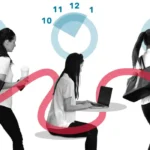In today’s competitive UK job market, job interviews play a pivotal role in determining whether a candidate is the right fit for a position and if the role aligns with their skills and career goals. Whether you’re a job seeker aiming to impress or an employer looking to hire the best talent, understanding key interview tips can significantly impact the outcome.
For job seekers, proper interview preparation can help you stand out among other candidates, showcasing your strengths and aligning your experience with the job requirements. For employers, job interview tips are essential for conducting effective interviews, ensuring you assess not only technical skills but also cultural fit and long-term potential.
In this guide, we will cover essential topics such as how to prepare for an interview, the most common interview questions in the UK, post-interview follow-up strategies, and key tips tailored for both job seekers and employers.
Key Interview Tips for Job Seekers
When preparing for a job interview, it’s crucial to approach it with thorough research and a clear strategy. Here are some key tips to help you stand out and increase your chances of success in the UK job market.
Research the Company and Role
One of the most important steps in job interview preparation is understanding the company and the role you’re applying for. Knowing the company’s history, values, culture, and recent news can help you tailor your responses and demonstrate genuine interest. For example, if a company has recently launched a new product or expanded its services, you can mention this in your interview to show you’re engaged. Understanding the job description will help you align your skills with the role and make your answers more relevant.
Practice Common Interview Questions
In the UK, there are several standard questions that most interviewers ask. One of the most common is, “Tell me about yourself.” While it may seem simple, this question is an opportunity to succinctly highlight your skills and experiences that are most relevant to the position. Other common questions include “Why should we hire you?” and “What are your strengths and weaknesses?” Practice your responses in advance, keeping them concise and relevant. Answering these questions effectively will leave a positive impression on the recruiter.
Dress Appropriately for the UK Job Market
In the UK, dressing appropriately for an interview is essential. The general rule is to dress professionally, but it’s important to match the company’s culture. For corporate roles, a suit or smart dress is standard, while creative industries may allow more casual attire. Regardless of the industry, your clothes should be neat, well-fitted, and free of distractions. Pay attention to grooming and avoid excessive accessories.
Prepare for Remote Interviews
With virtual interviews becoming more common, it’s essential to be well-prepared. Test your technology in advance—check your internet connection, webcam, and microphone. Choose a quiet, well-lit environment for the interview, and ensure there are no distractions. Dress as if you were attending an in-person interview to maintain a professional appearance. Also, practice speaking clearly and maintaining eye contact, even if it’s through a screen.
Different Interview Formats in the UK
In the UK job market, interviews come in various formats, each requiring specific preparation. Apart from traditional one-on-one interviews, you may encounter panel interviews where multiple interviewers participate, competency-based interviews focusing on your skills and past behaviour, assessment centres involving exercises and group activities, and phone screenings used as initial filters. Understanding these formats enables you to tailor your preparation, manage expectations, and perform confidently.
Prepare Your Questions for the Employer
At the end of most interviews, the employer will ask if you have any questions. Always be prepared with thoughtful questions that demonstrate your interest in the role and the company. For example, you could ask, “What are the company’s future goals?” or “What does success look like in this role?” Asking insightful questions not only shows that you’re serious about the job, but it also helps you gauge if the company is a good fit for your career goals.
By incorporating these interview tips into your preparation, you’ll improve your chances of impressing recruiters and securing your next opportunity.
Industry-Specific Interview Insights
Different sectors in the UK have unique interview expectations. For example, finance roles may focus heavily on technical and scenario-based questions, healthcare interviews often assess teamwork and empathy through situational questions, while creative industries look for portfolios and cultural fit. Researching industry standards can help you anticipate key areas to highlight and improve your chances of success.
Key Interview Tips for Job Providers
Conducting interviews is a crucial process for hiring the right candidate for your organization. By following a few key interview tips for employers, you can streamline the hiring process and ensure you’re selecting the best fit for your team.
Create a Clear Job Description and Criteria
A well-defined job description is essential to set clear expectations for both you and the candidate. By outlining the key responsibilities, qualifications, and skills required for the role, you create a transparent framework that helps guide the interview process. This also allows candidates to understand the role and whether they are a good fit, reducing confusion during the interview.
Ask Structured and Behavioural Interview Questions
When conducting interviews, it’s important to ask structured and competency-based questions. These types of questions are designed to assess a candidate’s skills, experiences, and cultural fit. For instance, you could ask, “Can you give an example of a time you managed a challenging project?” or “Tell me about a time when you had to work as part of a team to solve a problem.” These questions allow you to evaluate how candidates have handled situations in the past, which can be a good indicator of how they will perform in the future.
Promote a Positive Candidate Experience
The interview process is not only about evaluating candidates but also about providing them with a positive experience. A welcoming atmosphere helps candidates feel more comfortable and confident, allowing them to perform better. Start the interview with small talk to build rapport, and be sure to provide clear instructions about the interview process and timing. Ensuring that candidates feel respected throughout the interview will enhance your company’s reputation and encourage top talent to apply in the future.
Be Aware of Bias in the Interview Process
Unconscious bias can significantly affect hiring decisions. It’s essential to be aware of any biases that may influence your judgments, such as preferences for certain backgrounds or personal traits. To mitigate this, create a structured interview process and focus on the candidate’s skills, qualifications, and potential for success in the role. Promoting diversity and inclusion in the hiring process not only helps eliminate bias but also contributes to a more innovative and dynamic workforce.
Evaluate Candidate Responses and Skills Effectively
While technical skills are important, it’s equally essential to assess a candidate’s soft skills. Look for evidence of teamwork, problem-solving, communication, and adaptability. These attributes are critical in determining how well a candidate will integrate into your team and thrive in your organizational culture. By evaluating both technical and soft skills, you ensure that you hire someone who is not only qualified but also a great fit for your company.
By applying these interview tips for employers, you can conduct more effective interviews, evaluate candidates thoroughly, and ultimately hire individuals who will succeed in the role and contribute positively to your organization.
Legal and Ethical Interview Practices in the UK
Employers must ensure interviews comply with UK employment law, including equality and data protection regulations. Avoiding discriminatory questions about age, gender, ethnicity, or personal circumstances is crucial. Additionally, handling candidate information in line with GDPR is essential for maintaining trust and legality. Structured interviews and competency-based questions help mitigate unconscious bias and ensure fairness.
Common Interview Questions for Job Seekers and How to Answer Them
When preparing for an interview in the UK, it’s essential to be ready for common interview questions that recruiters often ask. Here’s how to answer some of the most frequently asked questions:
Tell me about yourself
This is usually the opening question in interviews. Keep your answer concise, focusing on your professional background, key skills, and relevant experiences. Tailor it to the role you’re applying for, highlighting how your background aligns with the company’s needs. Avoid going into too much personal detail—focus on what makes you a strong candidate.
What is your greatest strength/weakness?
For strengths, choose a quality relevant to the role, such as communication or problem-solving skills, and provide an example of how you’ve demonstrated it in previous roles. When discussing weaknesses, be honest but focus on a minor area of improvement and highlight the steps you’re taking to improve. This shows self-awareness and a commitment to growth.
Where do you see yourself in 5 years?
This question is often used to gauge your long-term commitment and career goals. Tailor your answer to the company and role you’re applying for. Show ambition, but also demonstrate your interest in growing within the organization. For example, you might say, “In five years, I hope to have advanced in this field and take on leadership responsibilities.”
Why do you want to work here?
This is where your research into the company pays off. Mention aspects of the company’s values, culture, or projects that resonate with you. Tailor your answer to show how your skills and interests align with the company’s mission.
Answering common interview questions in the UK effectively can set you apart from other candidates. Tailor each response to the specific role and company to demonstrate your enthusiasm and suitability.
How to Follow Up After an Interview
Following up after a job interview is a crucial step in demonstrating your professionalism and continued interest in the position. Here’s how to do it effectively:
1. Send a Thank-You Email
Sending a thank-you email after an interview is an essential post-interview follow-up step. It shows gratitude and reaffirms your interest in the role. In your email, thank the interviewer for their time, reiterate why you’re excited about the role, and mention specific points from the interview that further solidify your fit for the position. Keep it brief and professional.
2. Best Time to Follow Up
If you haven’t received any response within a week or two, it’s appropriate to send a polite follow-up email to inquire about the status of your application. This shows your continued interest and reinforces your enthusiasm without being pushy.
3. Requesting Feedback
If you’re not selected for the position, it’s a good idea to ask for feedback to help improve your future interviews. Keep your request polite and professional. A simple question such as, “I would appreciate any feedback you could provide to help me improve for future interviews,” works well.
Post-Interview Etiquette Beyond Follow-Up
Once interviews are complete, handle multiple job offers respectfully by communicating decisions promptly. If you choose to withdraw from a process, do so professionally to maintain positive relationships. When negotiating salary or benefits, be clear, courteous, and well-informed about market rates. These practices enhance your professional reputation within the UK job market.
Interview Follow-Up Email Template:
Subject: Thank You – [Your Name]
Dear [Interviewer’s Name],
Thank you for taking the time to meet with me regarding the [Job Title] position. I truly enjoyed our conversation and learning more about [Company Name]. I am excited about the opportunity to contribute to your team and believe my skills align well with your needs.
Please do not hesitate to contact me if you need any further information. I look forward to hearing from you regarding the next steps.
Thank you again for your time and consideration.
Best regards,
[Your Name]
By following these interview follow-up tips, you demonstrate your professionalism, express appreciation, and keep the lines of communication open, improving your chances of securing a job after the interview.
Common Interview Mistakes to Avoid
For Job Seekers:
- Over-sharing Personal Information
One of the most common interview mistakes to avoid is oversharing personal details that are irrelevant to the job. Keep your answers focused on your professional experience, skills, and how you can contribute to the company. Personal anecdotes that don’t align with the role can distract interviewers from your qualifications.
- Being Unprepared
A lack of preparation can significantly impact your performance. Not researching the company or understanding the role shows a lack of commitment and enthusiasm. Always come prepared with questions for the interviewer and insights about the company to show that you’re genuinely interested in the position.
- Not Asking Insightful Questions
When asked if you have any questions at the end of the interview, saying “No” can signal a lack of interest or initiative. Prepare thoughtful questions about the company culture, team dynamics, and role expectations. This demonstrates your proactive mindset and genuine curiosity.
For Employers:
Lack of Structure
A disorganized interview process can confuse candidates and lead to missed opportunities. Ensure that interviews are structured, with clear questions and a defined assessment process. This helps you evaluate all candidates fairly and consistently.
Poor Communication
Failing to clearly communicate job expectations, company culture, or the interview process can leave candidates unsure of their standing or next steps. Open communication throughout the process keeps candidates engaged and informed.
Ignoring Cultural Fit
While technical skills are important, cultural fit is just as crucial. Focusing only on a candidate’s qualifications without considering how they will fit into your team’s dynamics can result in a poor hiring decision. Look beyond just their resume and evaluate how well they align with your company values.
By avoiding these interview pitfalls whether you’re a job seeker or an employer—you can significantly improve your chances of success and ensure a more effective and efficient hiring process.
How to Prepare for a Virtual Interview?
Preparing for a virtual interview requires attention to detail, especially when it comes to technology and presentation. Virtual interview tips include testing your technology in advance ensure your camera, microphone, and internet connection are working properly. A common issue with video interviews is poor sound or video quality, so do a test run with a friend beforehand.
Your background matters too; choose a quiet, tidy space with minimal distractions. A plain wall or professional setting is ideal. Good lighting is crucial position yourself so the light is facing you, not from behind, to avoid shadows.
Dress as you would for an in-person interview. Even though you’re not meeting face-to-face, professionalism still counts. Lastly, make sure to have a backup plan in case of technical difficulties this could be a phone number or email to contact if the video call fails. Following these remote job interview best practices will help ensure a smooth and successful interview experience.
Final Tips for a Successful Interview
To achieve job interview success, both job seekers and employers should focus on preparation, clear communication, and mutual respect throughout the interview process. Successful interview tips for job seekers include researching the company, practicing common interview questions, and presenting themselves professionally. For employers, it’s essential to have a structured process, ask relevant questions, and create a welcoming environment.
Acing the interview is about making a positive impression, staying calm, and showcasing your skills and experiences. Winning interview strategies involve being well-prepared for any situation, whether it’s answering challenging questions or maintaining rapport.
By focusing on these strategies, both job seekers and employers can increase their chances of securing a job offer and ensuring a successful outcome.
Using Digital Profiles and Portfolios Effectively
In the UK, supporting your interview with a well-maintained LinkedIn profile or personal portfolio can boost your credibility. Ensure your digital presence aligns with your CV and highlights your achievements. Share links in interviews where appropriate to provide concrete evidence of your skills and experience.
Final Thoughts
To increase your chances of job interview success, start by applying the job interview success tips outlined in this guide. Proper preparation, researching the company, and practicing common questions are key to standing out. Whether you’re a job seeker or employer, following these strategies will help you secure interviews and ultimately get hired.
Job seekers, don’t forget to upload your CV on UK Job Now to make a lasting impression. Employers, post your job listings today and find the perfect candidate for your team!











